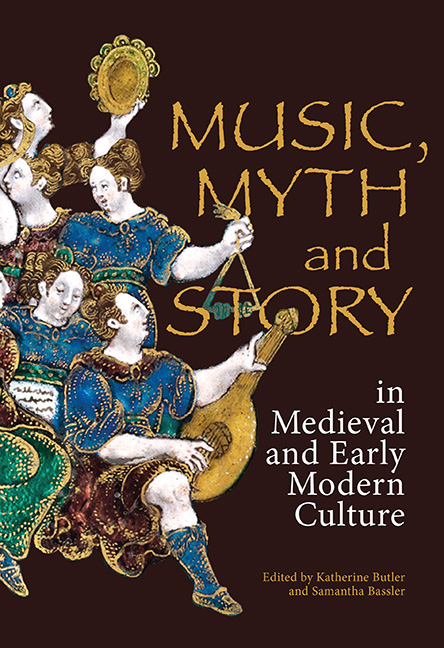Book contents
- Frontmatter
- Contents
- List of Illustrations
- List of Contributors
- Editors’ Note
- Introduction
- I MYTH IN MEDIEVAL MUSIC THEORY AND PHILOSOPHY
- II ICONOLOGIES OF MUSIC AND MYTH
- III MYTHS IN RENAISSANCE PHILOSOPHIES OF MUSIC
- IV MYTH AND MUSICAL PRACTICE
- V NARRATIVES OF PERFORMANCE
- VI MYTH AND MUSIC AS FORMS OF KNOWLEDGE
- VII RE-IMAGINING MYTHS AND STORIES FOR THE STAGE
- 14 ‘Armida's Picture we from Tasso Drew’?: The Rinaldo and Armida Story in Late Seventeenth- and Early Eighteenth-Century English Operatic Entertainments
- 15 Translating Myth Through Tunes: Ebenezer Forrest's Ballad Opera Adaptation of Louis Fuzelier's Momus Fabuliste (1719–29)
- Bibliography
- Index
- Studies in Medieval and Renaissance Music
15 - Translating Myth Through Tunes: Ebenezer Forrest's Ballad Opera Adaptation of Louis Fuzelier's Momus Fabuliste (1719–29)
from VII - RE-IMAGINING MYTHS AND STORIES FOR THE STAGE
Published online by Cambridge University Press: 24 October 2019
- Frontmatter
- Contents
- List of Illustrations
- List of Contributors
- Editors’ Note
- Introduction
- I MYTH IN MEDIEVAL MUSIC THEORY AND PHILOSOPHY
- II ICONOLOGIES OF MUSIC AND MYTH
- III MYTHS IN RENAISSANCE PHILOSOPHIES OF MUSIC
- IV MYTH AND MUSICAL PRACTICE
- V NARRATIVES OF PERFORMANCE
- VI MYTH AND MUSIC AS FORMS OF KNOWLEDGE
- VII RE-IMAGINING MYTHS AND STORIES FOR THE STAGE
- 14 ‘Armida's Picture we from Tasso Drew’?: The Rinaldo and Armida Story in Late Seventeenth- and Early Eighteenth-Century English Operatic Entertainments
- 15 Translating Myth Through Tunes: Ebenezer Forrest's Ballad Opera Adaptation of Louis Fuzelier's Momus Fabuliste (1719–29)
- Bibliography
- Index
- Studies in Medieval and Renaissance Music
Summary
EBENEZER Forrest's 1729 ballad opera Momus Turn'd Fabulist: Or, Vulcan's Wedding opens with a self-conscious conversation between actor and author:
Player: I perceive your scene is in the poetical Olympus, and your persons are introduc'd under the imaginary characters of the heathen gods.
Gentleman: ‘Tis true, sir, but those ancient fictions and characters are so accommodated, as to expose and ridicule the vices and follies of the present age.
The Gentleman – here, a loosely veiled stand-in for the author – repeats a common view on the power of myth in order to justify his opera's setting on Mount Olympus: that which is most fictional, ‘poetical’ or down-right imaginary can reveal society's most fundamental truths. For Augustan authors from John Gay to Jonathan Swift, no genre was more truthful than the fable. Consisting of imaginary, talking animals or stock deities, fables were pithy tales that conveyed moral lessons through allegory.
Forrest's opera is not only constructed of fables; it is itself a commentary on the fable genre. The lead character, Momus, the god of ridicule, is banned from speaking and is allowed only to communicate in the coded language of the fable. As Momus encounters gods and goddesses throughout the opera, he sings each of them a fable that reveals their very human flaws. Forrest combined the genre of ballad opera – constructed from popular tunes interspersed with spoken dialogue – with an ongoing concern for the fable as social commentary and, indeed, oblique conduit for conveying otherwise silenced critiques.
In an era when censorship was becoming increasingly stringent, writers often employed allegorical strategies similar to Forrest's to distance themselves from potentially offensive material while making their intentions clear enough to political sympathisers. Moreover, by obscuring authorship, they could attempt to prevent their publications from being banned. These conditions make the origins of Momus Turn'd Fabulist even more intriguing. Forrest based his opera on Louis Fuzelier's comedy Momus fabuliste, ou les noces de Vulcain, which premiered at the Comédie-Française in Paris to great acclaim in 1719. In re-working this French comedy for the London stage, Forrest translated the text and turned the spoken fables into sung ballads. Why would he turn to this particular French source and how did he approach the task of adaptation? Did he use ballads for similar ends as the original had used fables?
- Type
- Chapter
- Information
- Music, Myth and Story in Medieval and Early Modern Culture , pp. 259 - 276Publisher: Boydell & BrewerPrint publication year: 2019



